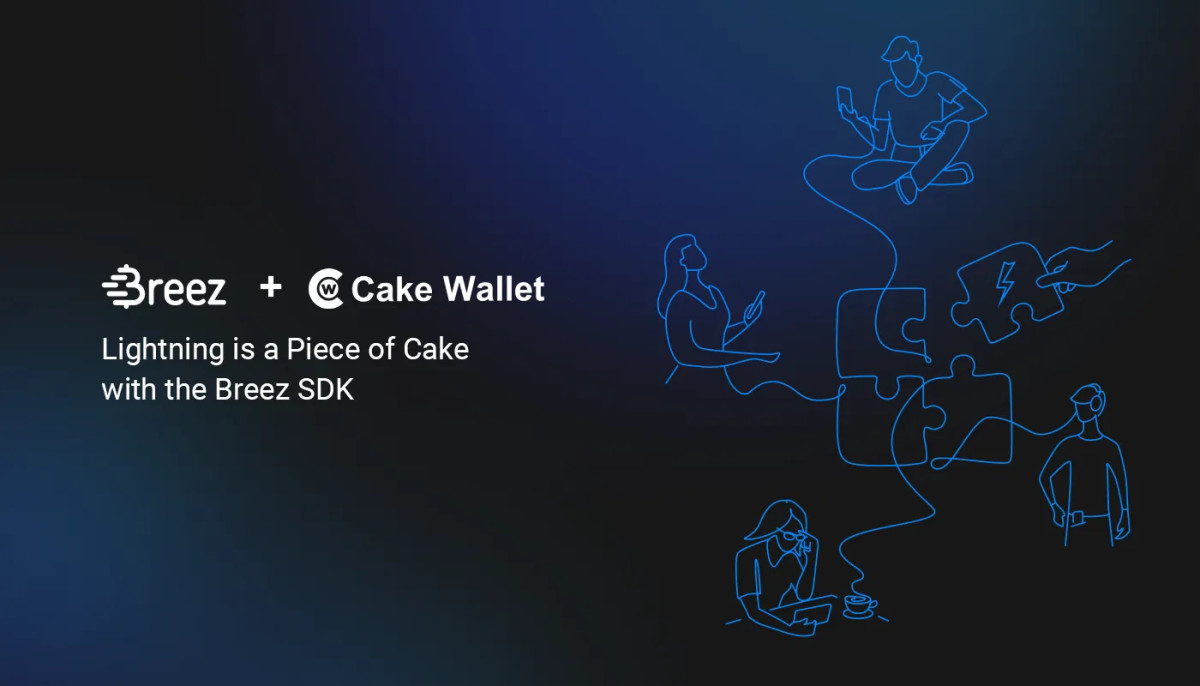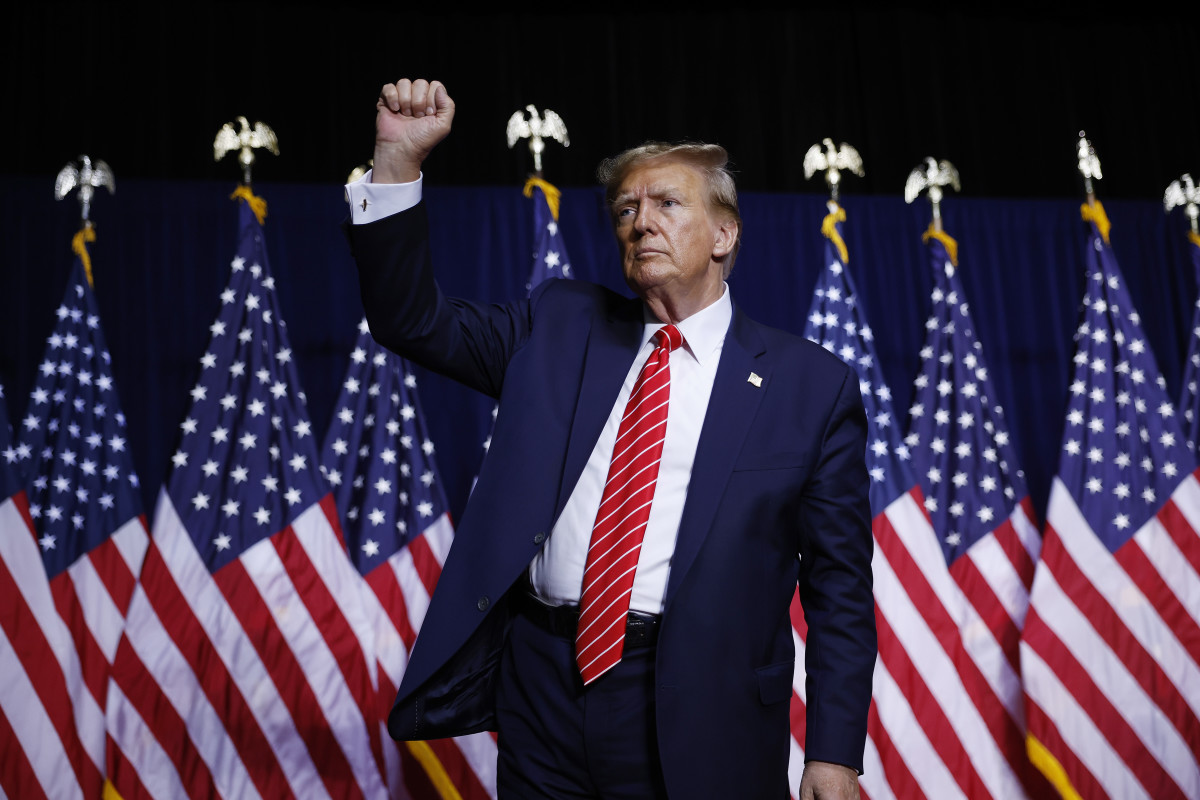Month: June 2024
Putin says Russia does not need to use nuclear weapons for victory in Ukraine
Post Content
Breez Brings Bitcoin’s Lightning Network To Every Crypto Wallet
Traditionally considered an odd couple, Bitcoin has made intriguing forays into the crypto ecosystem over the past year. Cake Wallet’s decision to integrate Lightning is an unexpected yet exciting development that continues this trend of Bitcoin integration. In doing so, Cake aims to make Bitcoin more practical for everyday use for its users.
In a post published yesterday, Breez CEO Roy Sheinfield emphasizes the “massive opportunity” this creates:
“Introducing Lightning to the broader world of crypto will help more users interface with Bitcoin, and Lightning is the tech that can put the currency into “cryptocurrency.” Bringing crypto and Lightning together is an inevitable step on the way to mainstreaming Bitcoin”.
This collaboration will see Breez’s open-source SDK, which includes Blockstream’s Greenlight node service, embedded into Cake Wallet, significantly enhancing its functionality. Breez’s SDK is designed to make integrating Lightning into any app straightforward, allowing for faster, cheaper Bitcoin transactions.
Vik Sharma, CEO of Cake Wallet, shared his thoughts on this integration: “We’re thrilled to partner with Breez to bring Lightning payments to our users. This upgrade means faster, cheaper Bitcoin transactions without compromising on privacy and security.”
Roy Sheinfeld, Breez’s co-founder and CEO, added, “Bitcoin is the internet’s native currency, and our goal at Breez is to make it as accessible and easy to use as possible. Partnering with Cake Wallet is a big step in that direction, opening up Lightning payments to hundreds of thousands of users.”
The integration of Lightning via the Breez SDK aligns with Breez’s mission to make Bitcoin more accessible and practical for everyday transactions. Breez’s technology not only provides seamless integration but also ensures users maintain control over their funds, offering a non-custodial solution that emphasizes privacy and security.
Breez’s SDK supports various features such as sending and receiving payments, swaps, BOLT 11 payments, and the open-LSP model, which allows apps to choose and change their Lightning Service Providers (LSPs) as needed. This flexibility ensures that integrating the SDK doesn’t lock users into a single service provider, promoting an open and adaptable ecosystem.
Cake Wallet has been on a roll lately as they recently introduced silent payments, another new and impressive privacy feature for Bitcoin users.
For those eager to try it out, the public release of the Lightning-enabled Cake Wallet is expected in July 2024. This new feature promises to make Bitcoin transactions smoother and more efficient for everyday users.
What Does Hyperbitcoinization Look Like?
Hyperbitcoinization is the belief that eventually all goods and services will be priced in bitcoin instead of dollars. If you identify as a Bitcoin maximalist, you might have already accepted this as a given. But what does this process actually look like over time? What are key milestones that we can point to that would indicate hyperbitcoinization is taking place? In this post, I explore current Bitcoin financial products, geopolitical reasons governments will adopt bitcoin, why central banks will adopt bitcoin and more.
Merging Bitcoin with Traditional Finance
As adoption continues, more companies will offer Bitcoin financial products and further merge Bitcoin into the traditional finance world. Unchained is a company at the frontier of this world whose financial products include USD loans collateralized with bitcoin, bitcoin inheritance and taxed advantaged retirement accounts. Unchained is also helping people use these products in a secure self-sovereign manner: incentivizing key ownership, collaborative multisig custody and building out the “network of keys.”
Meanwhile is a life insurance company denominating premiums and payouts in bitcoin backed by Sam Altman that offers insight into the future of bitcoin denomination. While bitcoin’s value is volatile in the short term, we can safely assume that it will beat inflation over long time frames. How much purchasing power do you think $300k will have in the future compared to 5 bitcoin? Which would you prefer your loved ones receive in the event of your untimely passing?
I expect financial products that denominate payouts in BTC will be long-dated at first. As Bitcoin adoption continues, liquidity will increase and price volatility will decrease. This will make financial institutions more comfortable creating products that payout in bitcoin over shorter time frames. This reminds me of how Austrian economists think of hard money versus soft money when it comes to saving and spending. Throughout history, the harder money, gold, was hoarded and used for larger payments, while silver and other softer money were used to settle everyday payments.
Unlocking Efficiencies in Existing Payment Rails
Bitcoin will increasingly be integrated into payment infrastructure. While there are untold amounts of amazing work in Bitcoin infrastructure I can mention, I specifically want to focus on infrastructure created by Synota. Synota is a company using the Lightning Network to reduce frictions of traditional payments between energy producers and consumers. Synota is currently focusing on energy payments between miners and energy producers.
In the current payment infrastructure between energy consumers and providers, payments happen every 30 days or more. Energy providers take on credit risk in this system. With Synota, settlement can happen every day or every week over the Lightning Network. While this system still ultimately pays energy providers USD by converting bitcoin to USD at the end of the process, it is evidence that bitcoin rails create efficiencies in traditional payment systems. While I have not yet heard of any instances of energy providers accepting payment directly in bitcoin, Synota provides them the option to do so.
While final settlement isn’t yet happening in bitcoin, the infrastructure exists in the background and will continue to proliferate.
Geopolitical Incentives
After Russia invaded Ukraine, $300 billion in Russian assets held in Western banks were frozen, and recently the Biden administration discussed using those assets to continue funding the war in Ukraine. Morality of this conflict aside, this incentivizes countries to hold a greater portion of their assets in bitcoin because of its non-confiscatable properties.
Another geopolitical factor to consider is that many countries don’t use US dollars and treasuries because they want to, they do it because they have to. Attempts to form financial networks without US dollars and treasuries suffer from lack of liquidity and price volatility: this makes it difficult to preserve value outside of USD. As bitcoin becomes more liquid, I anticipate that it will be used as collateral in repo markets, markets where financial institutions borrow USD, and eventually to settle payments between non-western countries.
Bitcoin will become so important that BRICS countries will form mining alliances to protect themselves in the event that Western countries force miners within their jurisdiction to censor transactions from certain addresses.
Strengthening Central Bank Balance Sheets
The US treasury bonds are seen as the safest asset internationally, but the recent hike in treasury bond interest rates due to monetary policy decisions in response to COVID led to instability in bank balance sheets. Silicon Valley Bank (SVB) went bust because they held Treasury bonds with low interest rates. When depositors realized SVB’s assets no longer matched their liabilities, there was a run on the bank: US treasuries made SVB vulnerable.
Bitcoin will eventually be recognized as an asset that makes balance sheets more robust. Market volatility increased after 1971 when the US dollar completely broke its link to gold. Bitcoin will be used as an asset to strengthen balance sheets and the percentage of bitcoin held by companies, financial institutions and even central banks will continue to rise.
Bitcoin, the World Reserve Currency and the Sovereign Individual
At some point, a faction in the US will see Bitcoin as a threat to Western finance and the reserve currency status of the dollar. This faction will attempt to punish bitcoin holders via high taxes, limiting self-custody, and more. Ultimately, that faction will cave due to capital flight. Jurisdictions friendly to Bitcoin will benefit from an influx of wealthy individuals and their economies will thrive.
Texas is a great example of this. Texas became a Bitcoin mining powerhouse because they deregulated their energy grid in 2002 leading to some of the lowest energy prices in the US. Miners fled China and New York to operate in Texas and now Texas is one of the leading mining centers in the world. High state capital gains taxes in New York and California also punish wealthy individuals, further incentivizing them to move to places like Texas where the state capital gains tax is zero.
Capital, talent and power will accumulate in these types of regions. These incentives will play out on the world stage as well. Expect Bitcoin friendly nations like El Salvador to thrive. Adopt Bitcoin and experience affluence and growth; fight it, and experience capital flight.
Will everything be priced in BTC?
At bare minimum, I expect currency at central banks to be backed by bitcoin, which I suspect will lead to positive effects for the everyday person merely by limiting wild credit swings common in the fiat economy. A key factor that plays into a future where “everything is priced in bitcoin” will be how likely people are able to have direct access to their bitcoin without a third party. If we really believe that bitcoin will gain mass adoption, transaction fees will skyrocket and it will not make sense to transact on layer 1 Bitcoin if the value of the transaction is under tens of thousands of dollars.
Will people hold bitcoin or will they hold bitcoin IOUs? I cannot reliably say, but I cannot rule out the hard work being done in the bitcoin development scene. I arrived at the conclusions of this post by playing out how I think groups will react to Bitcoin when pursuing their self-interest, but there is an altruistic aspect to adoption. The ultimate X factor in hyperbitcoinization are the developers who turned down jobs at high paying tech companies because their passion is building freedom technology.
Organizations, companies and individuals like Fedi, Lightning and Nostr developers, Start9 and others are acting in the spirit of Satoshi to create finite, censorship-resistant peer-to-peer money for all. If we eventually live in a world where everything is priced in bitcoin, it will be because the altruists developed the technology to cheaply transact in bitcoin in a self-sovereign manner.
This is a guest post by Julian Martinez. Opinions expressed are entirely their own and do not necessarily reflect those of BTC Inc or Bitcoin Magazine.
Botanix’s Federated Sidechain Is Bringing Proof of Stake To Bitcoin
In a recent interview with Bitcoin Magazine, Shinobi sat down with Willem Schroé from Botanix Labs to discuss the progress and vision behind Spiderchains, an innovative scaling solution soon to be released to the public. Despite the flurry of attention surrounding other layer solutions like BitVM and rollups, the team at Botanix has been steadily laying out the groundwork for a distributed network capable of supporting 10,000 nodes, leveraging a unique combination of multisig and proof-of-stake (PoS) mechanisms.
Design Overview
Schroé describes Spiderchains as a decentralized network of multisigs, similar in concept to the Lightning Network but using a different architecture. “If you start with this idea of a multisig, but then think bigger…you will generate one multisig, a bigger multisig, then a frost multisig of 100 random members.”
This decentralized network of multisigs forms the backbone of Spiderchain, ensuring the security of the assets deposited to the platform. Spiderchain uses the Ethereum Virtual Machine (EVM) as an execution environment and secures it using a novel PoS mechanism, enhancing the network’s security and decentralization. The design aims to address issues commonly associated with other layer 2 solutions, particularly those on Ethereum, which often suffer from centralization and security vulnerabilities. The architecture of Spiderchain prioritizes decentralization and security through its unique integration of multisig and PoS mechanisms.
Combining Proof of Stake and Proof of Work
Building a PoS consensus layer on top of Bitcoin’s proof of work (PoW) system addresses many issues inherent in pure PoS systems. Willem, once a “proof of work maximalist,” explained the benefits of this hybrid approach. The combination of PoS and PoW also solves security concerns related to randomization and finality. This integration allows Spiderchain to inherit the finality of Bitcoin, further strengthening its security model.
By using Bitcoin’s block hash for randomization, Spiderchain ensures a secure and reliable method for selecting validators, thus enhancing the overall stability and security of the network. Schroé pointed out that this unique approach resolves many of the centralization and security issues that typically plague pure PoS systems.
Security and Forward Security
One of the standout features of Spiderchain is its forward security, a concept borrowed from encryption. Forward security means that even if a key is compromised, it cannot be used to decrypt previous transactions, enhancing the overall security framework of the network. This feature ensures that historical transaction data remains secure even if future keys are exposed. The protocol achieves this by frequently rotating keys and using unique keys for each transaction, preventing any single point of failure from compromising the entire chain’s security.
“When you think about the roadmaps of different rollups, at some point for upgradability, you’ll have to introduce a time delay. But even with a time delay, let’s say you have a two-week time delay or a 30-day time delay, after those 30 days, an attacker still knows exactly that he’ll be able to steal the funds. With forward security, that’s a big unknown.”
This approach not only protects past transactions but also bolsters trust in the network’s resilience against potential attacks.
Slashing and Capital Efficiency
Spiderchain also implements slashing rules to penalize malicious stakers, further securing the network. This robust mechanism ensures that any malicious actions are promptly and effectively addressed. Moreover, the design of provides capital efficiency and decentralized ownership. Unlike other layer 2 solutions that rely on a single smart contract with a large amount of funds, Spiderchain distributes the risk across multiple multisigs. “You no longer have that honeypot, you also have suddenly like decentralized ownership. There’s no single party that can own that whole thing,” Schroé emphasized. This design also allows for greater participation and security, making it a significant improvement over existing models.
Progress and Vision
Willem acknowledged the complexity of building on Bitcoin, even with recent advancements. He emphasized Botanix Labs’ dedication to the project and their focus on moving from white paper concepts to a fully functional product. “There’s a lot to be built. It’s not easy to actually build to go from that white paper to actually to a working product. And so we’ve been heads down, we’ve been building,” he explained.
Looking ahead, Willem shared the exciting news that the federated sidechain of Spiderchain is expected to go live soon. “We’ve implemented the bigger Frost Multisigs, we’ve built the initial federation. We will start with a federated sidechain and basically build out from there.” he announced.
Botanix’s Spiderchain has been live on testnet since November and has already processed over one million transactions.
Why Donald Trump Loves Bitcoin
President Donald Trump has made a calculated pivot to embrace Bitcoin and crypto, sensing a strategic advantage against incumbent Joe Biden in the 2024 election. While Biden has projected hostility toward Bitcoin, Trump directly appeals to the growing voter bloc of Bitcoin supporters.
In recent months, Trump began accepting Bitcoin donations, became the first-ever U.S. president to accept Bitcoin lightning payments and promised pro-crypto policies if returned to the White House. This marks a notable shift for Trump, who was previously indifferent toward Bitcoin and crypto.
BREAKING: 🇺🇸 Donald Trump becomes first American President to accept #Bitcoin Lightning payments for campaign donations ⚡️ pic.twitter.com/3lERakV64p
— Bitcoin Magazine (@BitcoinMagazine) June 2, 2024
However, with over 50 million Americans now owning Bitcoin and other digital assets, Trump sees a ripe opportunity to peel away these voters from Biden’s coalition.
At campaign rallies and repeatedly on social media, Trump has attacked Biden’s antagonistic stance toward crypto. He has accused Biden of trying to “kill” the nascent Bitcoin and crypto industry and halt American innovation in the space.
Trump said he is “very positive and open-minded to crypto” and that, as president, he would ensure the U.S. leads the world in adopting this new technology. He added, “I will support the right to self-custody to the nation’s 50 million crypto holders.”
In contrast, Biden has advanced concrete anti-crypto measures. He vetoed a bipartisan bill that would limit restrictive SEC oversight of cryptocurrencies, published a report starkly criticizing Bitcoin’s energy use, and promoted developing a central bank digital currency instead of embracing decentralized cryptocurrencies like Bitcoin. His Treasury Department has also laid out an agenda to impose stricter regulations that would stifle crypto innovation.
Biden seems to have failed to recognize Bitcoin’s surging populist appeal among millions of ordinary voters. With polls showing that up to a third of voters weigh candidates’ crypto policies, Trump is strategically tapping into this large constituency that Biden has snubbed.
At recent libertarian-leaning gatherings, Trump has railed against central bank digital currencies, vowing as president he would never allow the Federal Reserve to “rob your money” through such a system. He also made headlines by promising to pardon Silk Road founder Ross Ulbricht, delighting many Bitcoin enthusiasts.
Trump understands that hostility toward Bitcoin could further push voters toward libertarian-minded candidates extremely hesitant to back expanding government regulations. Unlike past presidents who feared Bitcoin, Trump sees that vocally supporting Bitcoin garners populist appeal with his base.
While such a pivot may be politically opportunistic, Trump’s embrace illustrates that Bitcoin’s political influence is rapidly rising. Bitcoin’s inherent game theory means politicians must either attack it or fully embrace it—and openly snubbing Bitcoin’s growing base of millions of voters is now potential political suicide. As Mark Cuban recently said, the anti-crypto stance could cost Biden the Presidency.
NEW: 🇺🇸 Billionaire Mark Cuban says anti-crypto stance could cost Biden the Presidency.
The 1st #Bitcoin Election 🙌 pic.twitter.com/nOpzmpHFA9
— Bitcoin Magazine (@BitcoinMagazine) May 14, 2024
Whether genuinely supportive or not, Trump’s political calculus clearly understands this new reality—that Bitcoin is now a potential make-or-break issue that could swing close national elections.
Semler Scientific To Raise $150M To Buy More Bitcoin
Medical device manufacturer Semler Scientific (Nasdaq: SMLR) announced it acquired 247 additional Bitcoin for $17 million in cash, bringing its total holdings to 828 BTC. The company also plans to raise $150 million to expand its Bitcoin reserves.
JUST IN: BlackRock spot #Bitcoin ETF IBIT had $347.1 million inflows today. pic.twitter.com/SIKByVcctA
— Bitcoin Magazine (@BitcoinMagazine) June 6, 2024
Semler made waves last month when it adopted Bitcoin as its primary treasury reserve asset, mimicking MicroStrategy’s influential corporate Bitcoin accumulation strategy. After its initial 581 bitcoin purchase, Semler has continuously acquired more coins.
CEO Doug Murphy-Chutorian said “Semler remains focused on our two strategies of expanding our healthcare business and acquiring and holding bitcoin. We will continue to pursue our strategy of purchasing Bitcoins with cash.”
The company filed an S-3 form with the SEC outlining its plan to raise $150 million in debt, a portion of which will go toward buying more Bitcoin. Semler noted in the filing that it sees bitcoin as a “reasonable inflation hedge and safe haven amid global instability.”
Semler is following the lead of MicroStrategy, which has accumulated over 200,000 Bitcoin and catalyzed the recent trend of public companies adding Bitcoin to their balance sheets. After MicroStrategy began its Bitcoin buying spree in 2020, its stock price rose dramatically as investors responded positively.
Other firms like Japanese public company Metaplanet have also started following MicroStrategy’s Bitcoin treasury allocation playbook this year. They recognize that holding scarce asset like Bitcoin can potentially boost their enterprise value.
This demonstrates Bitcoin’s game theory in action, as corporations increasingly adopt Bitcoin to maximize shareholder value. Semler’s continued acquisition of Bitcoin reflects its belief that adding it to its balance sheet can significantly enhance its business.
As this recent trend gains mainstream validation, more public firms will likely warm to Bitcoin and follow Microstrategy’s playbook.
Dollar flat ahead of key payrolls report; euro steady after ECB cut
Post Content
Asia FX muted, dollar nurses weekly losses with nonfarm payrolls in focus
Post Content
Oslo Freedom Forum Witnesses Global Momentum For Bitcoin And Activism
On Wednesday, social-minded Bitcoin proponents from Kenya to Canada to Russia convened on the final day of the 2024 Oslo Freedom Forum as part of the Financial Freedom Track event to offer their insights on how Bitcoin can be a tool for those around the world who need it most.
Alex Gladstein, Chief Strategy Officer for the Human Rights Foundation (HRF), the organization that puts on the Oslo Freedom Forum, kicked off the day by discussing why Bitcoin is essential in a human rights context. He then read two pertinent passages from Lyn Alden’s book Broken Money: Why Our Financial System Is Failing Us And How We Can Make It Better before inviting the author, an esteemed macroeconomic analyst, to the stage.
Alden provided a brief overview of monetary history before making the point that Bitcoin gives anyone anywhere in the world access to a free and open financial system. She also pointed out that Bitcoin, now 15 years old, has matured and has become easier to use and is also quite liquid, aspects of the network and asset that make it better suited for a human rights context than it was in its earlier days.
Hadiya Masieh, founder of the Groundswell Project, an organization that works to foster tolerance and empathy amongst diverse communities, then took the stage to present her talk entitled “How Bitcoin Can Fund Counter-Terrorism.” She highlighted how she’s taught Somali women how to use bitcoin to fundraise for political campaigns for female political candidates in the country.
Hadiya Masieh sharing with the crowd how Middle Eastern and African women benefit from Bitcoin.
Noble Nyangoma, CEO of the Bitcoin Innovation Hub, spoke soon after Masieh, discussing the work she does with refugees in Uganda, many of whom are not yet Ugandan citizens and therefore cannot open bank accounts in the country. She stressed that Bitcoin is essential for these refugees.
“With Bitcoin, no one is going to ask you ‘Where is your national ID?’” said Nyangoma.
One of the most moving talks of the day came from Farida Nabourema, a Togolese activist and Executive Director of the African Bitcoin Conference. She shared a harrowing account of how she once needed an emergency surgery in Ghana and almost didn’t receive it because she didn’t have enough money in the local currency on her at the time of the surgery to pay for it.
She did, however, have enough funds in her home country’s currency to make the payment, but the hospital wouldn’t accept it. The point she was making was that Africa is divided financially by the many different currencies on the continent, none of which can be used across borders.
She explained that Bitcoin fixes this, as it helps create a world — especially in Africa — in which the situation she experienced in that Ghanaian hospital could have been avoided.
Before the lunch break, Ben Perrin, better known as BTC Sessions, gave a presentation on how to use bitcoin in a high-fee environment, and Alex Li, a member of the HRF team, announced the 10 winners of of it Bitcoin Development fund grants for software developers who create tools that add to privacy on the Lightning Network, build decentralized communications and provide technological tools to human rights defenders.
In the afternoon, Sparrow Wallet developer Craig Raw detailed a number of practical ways to use Bitcoin more privately, while Lorraine Marcel, founder of Bitcoin DADA, a virtual Bitcoin education platform and community for African women, shared stories of how Bitcoin is catalyzing notable changes in her students.
“Before Bitcoin I could not really see a true way of getting financial freedom or independence for me or my sisters back at home,” said Marcel during her presentation. She went on to share that the organization also uses bitcoin as a fundraising tool to help fund an initiative that provides feminine hygiene products and educational materials to female students in Kibera, one of the biggest urban slums in Africa.
Lorraine Marcel speaking about her work with Bitcoin DADA.
Calle, an anonymous software developer who created the Cashu protocol, an ecash protocol that offers more transactional privacy with Bitcoin, provided an overview of how ecash works and how the privacy it provides can benefit activists.
Toward the middle of the afternoon session, Christian Keroles, Director of Financial Freedom at HRF, interviewed Luthando Ndabambi, Community Leader at Bitcoin Ekasi, a circular Bitcoin economy located in a South African township. Ndamambi told Keroles that before bitcoin, he and many others in his community had no means of saving, which led them to not thinking much about their futures.
“I tell people in my township, ‘When you think about Bitcoin, think about saving for your kids,’” said Ndabambi.
Soon after, Peter McCormack, host of the What Bitcoin Did podcast, sat down with Mike Brock, head of TBD at Block, and Anna Chekhovich, CFO at Alexey Navalny’s Anti-Corruption Foundation and HRF Non-Profit Bitcoin Adoption Lead. The three discussed how Bitcoin can help preserving democracy as well as the effects of the crackdown on privacy-focused Bitcoin wallets in the US.
“For us to receive donations, we [have to] provide our donors with high-level security tools for payments,” explained Chekhovich.
“If there is a tiny chance that your personal data is going to be leaked to the government and they will put you [in] jail, of course you will not make a donation. That is why privacy tools are crucial, and at the Anti-Corruption Foundation, we are very concerned about that. We try to do everything we can in order to provide safety to our donors,” she added.
“If we are deprived of these privacy tools we will not be able to accept bitcoin donations, because we cannot put our donors at such a huge risk.”
Dulce Villarreal, CEO and founder of Librería de Satoshi (Library of Satoshi), a Bitcoin hub that provides Bitcoin educational materials and classes as well as financial support for Bitcoin developer students, stated that she’s concerned about the fact that more than 50 million people live under dictatorships in Latin America and that central bank digital currencies (CBDC) will only further enable autocratic leaders on the continent.
Therefore, she’s on a mission to make Bitcoin ubiquitous by helping to train people from around the world to work on and support Bitcoin.
“Our mission is to make Bitcoin technical training accessible in your own language,” said Villarreal. “At Librería de Satoshi, our goal is to foster the next generation of Bitcoin contributors, entrepreneurs, educators.”
The day concluded with a fireside chat with Jack Mallers, founder and CEO of Strike, and Matt Odell, Managing Partner at Ten31 and co-founder of OpenSats. The two discussed the importance of profitable Bitcoin businesses contributing to open-source developers, much like the way that Strike announced it would be donating $100,000 to the OpenCash Association, a non-profit that supports such developers, which was founded by the aforementioned Calle.
“Through my work with HRF and coming here, there is a duty that I have to make sure Bitcoin is successful, although not maybe in my shareholders’ [or] in my corporation’s immediate interest,” explained Mallers. “That’s part of the game theory that makes the whole project work. And so no matter your role, we’re all on the same team. If Bitcoin is better, we’re all better off for it.”
Strong words to end a conference that featured the voices of so many who have gone above and beyond to ensure that we are all in fact better off because of Bitcoin.
Dollar flat ahead of US jobs report, euro digests ECB cut
Post Content








